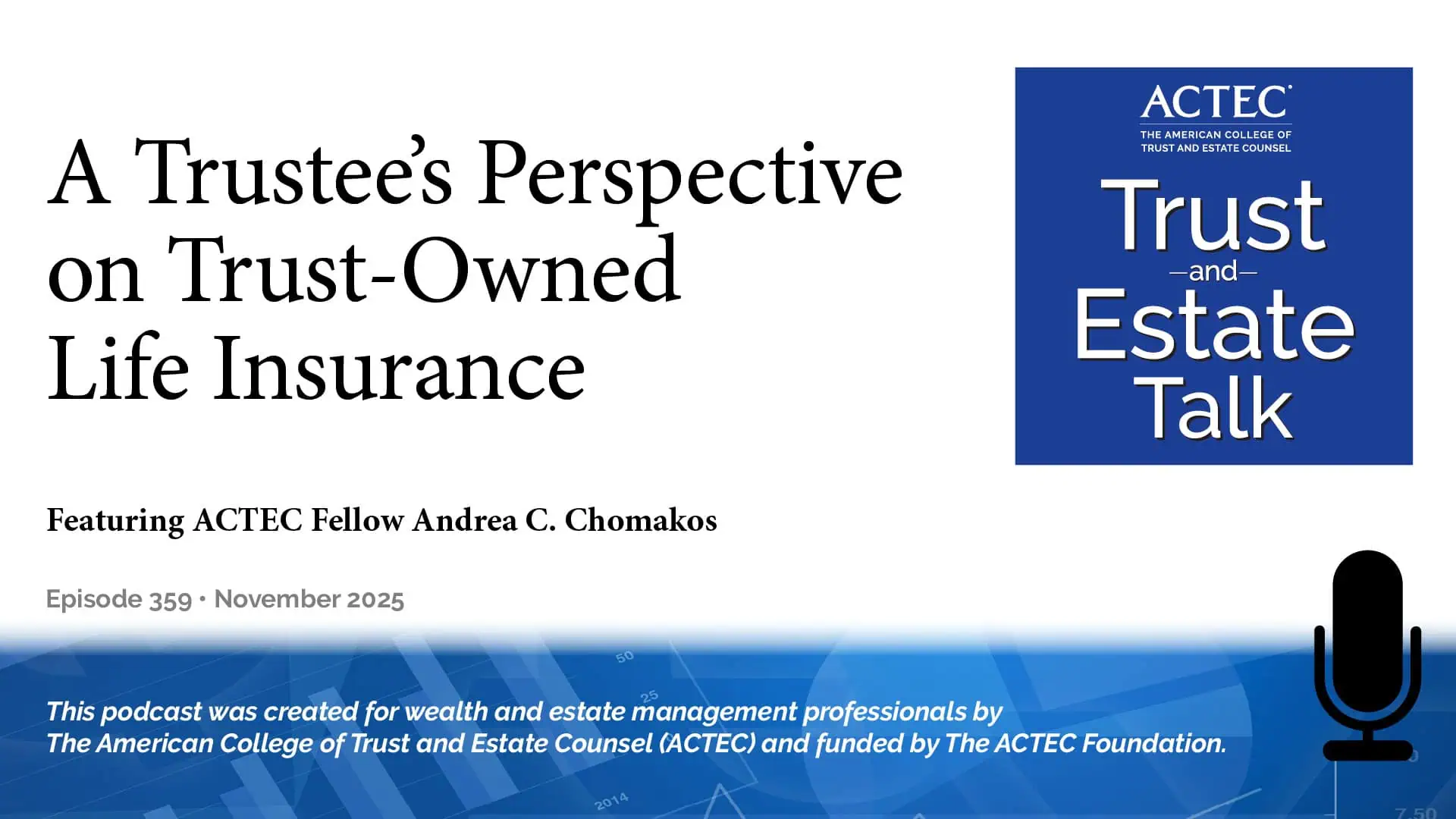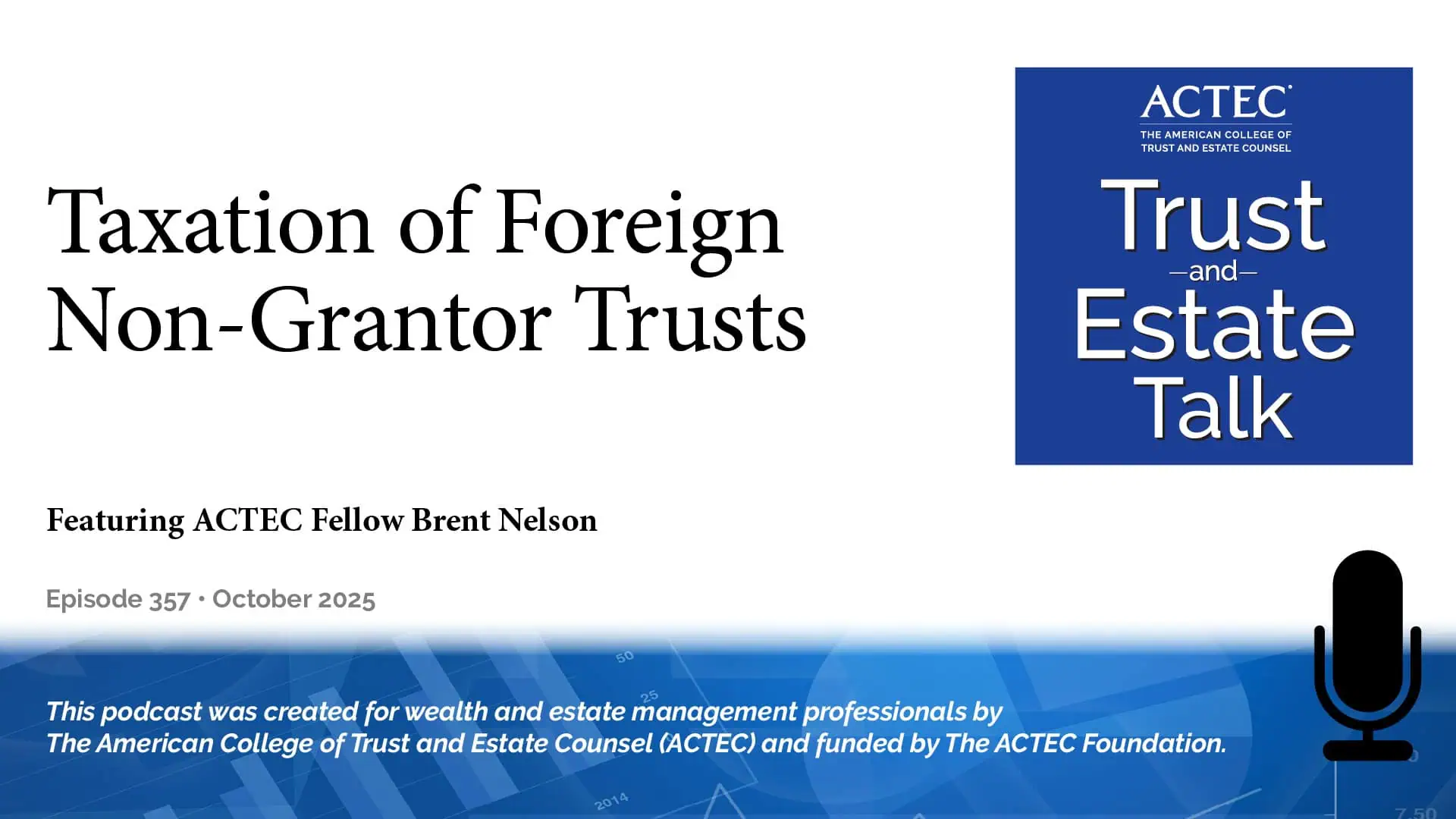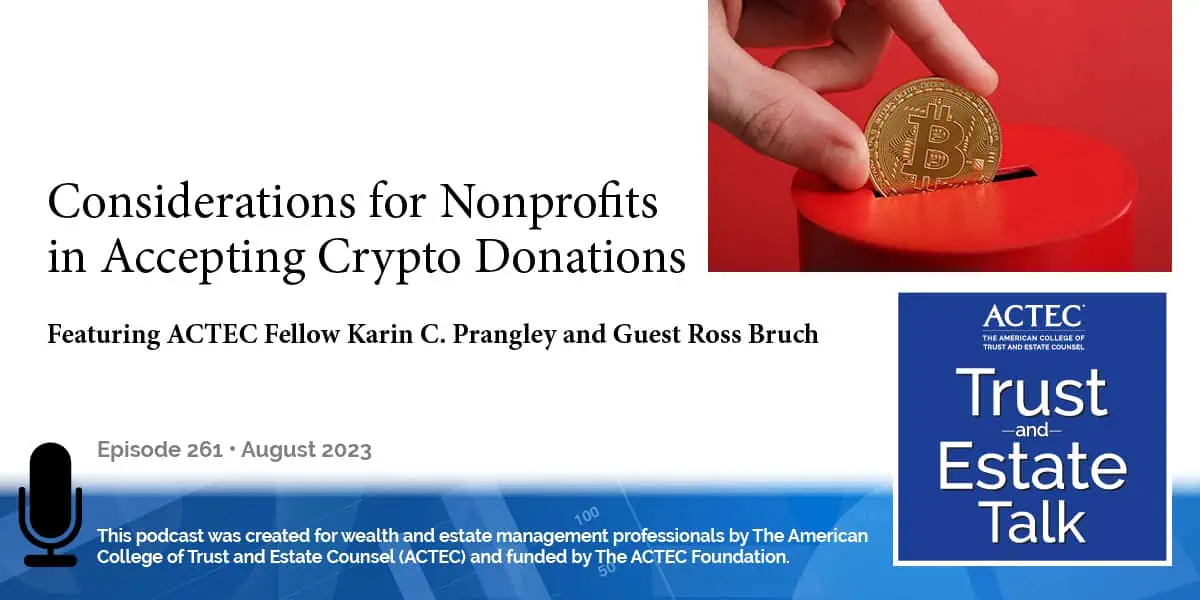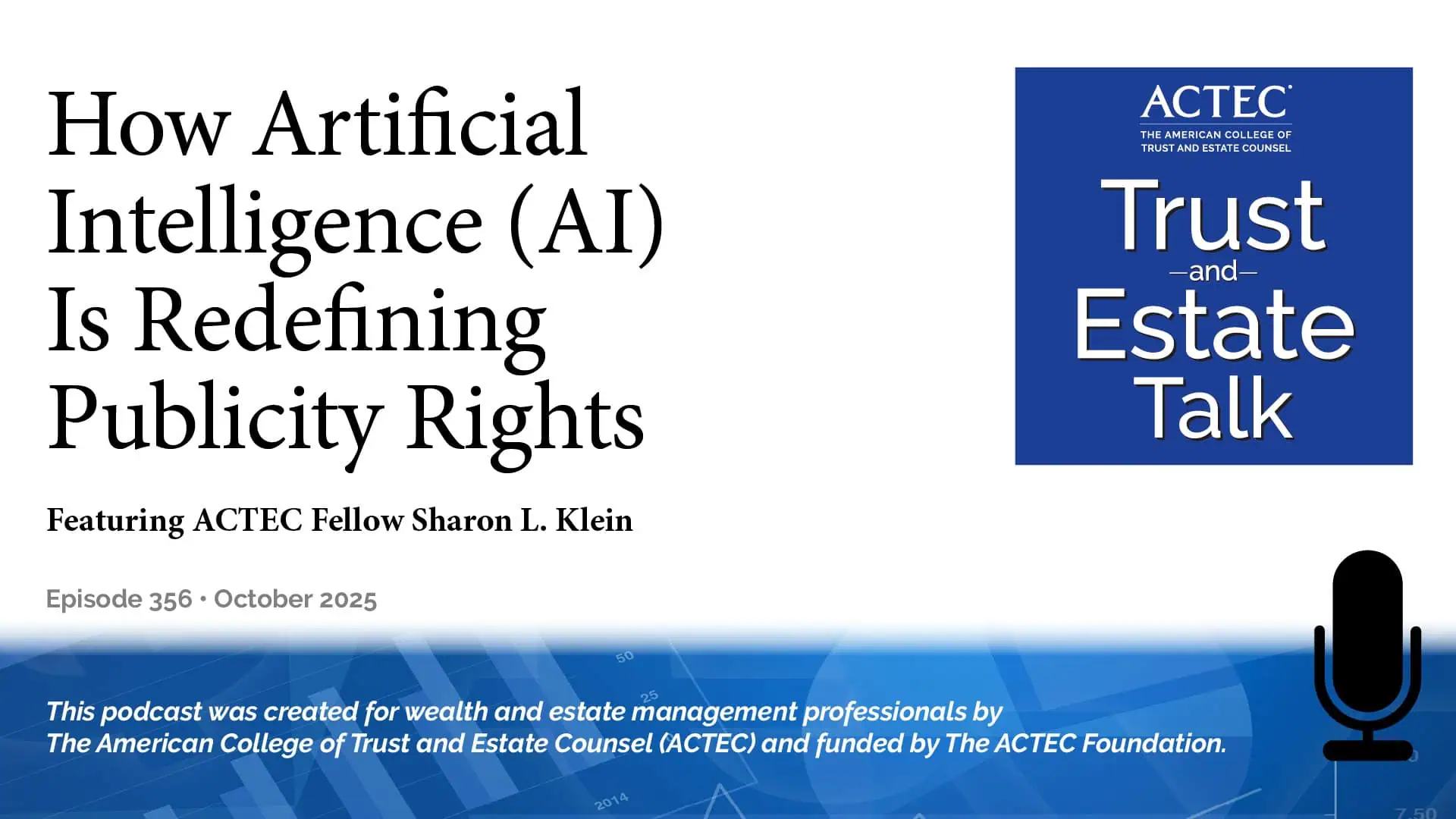Considerations for Nonprofits in Accepting Crypto Donations
Transcript/Show Notes
This is Travis Hayes, ACTEC Fellow from Naples, Florida. Nonprofit organizations are receiving cryptocurrency donations, a relatively new asset class to their organizations. What factors should these nonprofits consider when evaluating whether and how to accept cryptocurrency donations? ACTEC Fellow Karin Prangley of Chicago, Illinois and guest Ross Bruch, a Senior Wealth Planner at Brown Brothers Harriman in Philadelphia, join us today to help us answer this question and discuss this topic. Welcome, Ross and Karen.
Introduction to Cryptocurrency Donations
Ross Bruch: Thank you, Travis. So, despite cryptocurrency’s prevalence and evolution, there remain a number of risks to parties accepting or holding blockchain assets, including nonprofits. These risks may include the fact that cryptocurrency is a largely unregulated, highly violated asset class. We don’t know when or if regulation is coming. Also, hacking is everywhere. There’s little or no insurance or recourse for hacked or lost crypto accounts. Because cryptocurrencies are designed to be held and exchanged anonymously, it is very difficult to prove that the holder’s cryptocurrency originated from a legitimate source. Thus, implying possible “know-your-client” or anti-money laundering and reputational risks.
Additionally, nonprofits that take advantage of blockchain strategies like DAOs (Decentralized Autonomous Organization) risk technological changes that render their project ineffective or vulnerable. However, there’s also benefits to consider should nonprofits choose to accept blockchain assets.
For example, it allows the attraction of additional donors. Crypto can be a very attractive asset class if the holder has a large, unrealized gain. But note, there are some fine-print points to consider. Crypto acquired for investment purposes – for example, if it’s not mined – is treated like privately held stock or property for donation purposes.
Contributions of crypto to a public charity held for longer than one year receive a full fair-market-value deduction. For a donation of over $500, donors must complete Form 8283, and for donations over $5,000, donors must complete Section B of Form 8283 and provide a qualified appraisal, which recent CCM No. 202302012 confirmed.
Substantial crypto holders are readily donating crypto to Donor Advised Funds and Charitable Remainder Trusts. Typically, these structures involve larger gifts. Blockchain giving engaged the donor in more innovative giving, building a deeper connection to the cause and a more engaged donor.
Steps for Nonprofits Accepting Crypto
Karin Prangley: Ross did a great job in telling us some of the benefits of accepting gifts of cryptocurrency. Obviously, the bottom line is its revenue for your organization, so you should be very keen to accept it. But as Ross also identified, there are some risks. So, it would very reasonable, after the considering the risks, to proceed with an acceptance, if you have an acceptance policy and acceptance procedures, which help mitigate risks. No. 1 is to take possession in a way that’s safe, and No. 2 is to sell the cryptocurrency as quickly and as safely as possible, so you can just have regular fiat currency into your not-for-profit’s coffers.
The first issue on possession is, does the organization take possession directly or will the organization use some kind of intermediary or processor to ultimately end up with fiat currency after the sale of the cryptocurrency?
Crypto Wallet Considerations
If the not-for-profit organization chooses to accept possession directly, the not-for-profit organization has to get a wallet. Popular providers of wallets include Coinbase, MetaMask, Gemini, and Binance. But the hiccup and the concern in directly getting a wallet and accepting possession is that there are a lot of questions in the onboarding process for a wallet, which makes not-for-profits a little uncomfortable.
So, these wallets are really not set up to be held by institutions or organizations. The wallet application sort of says “First Name, Last Name.” It gets a little tricky to open up a wallet in the name of a not-for-profit organization. Ultimately, not-for-profit organizations have found that there are very personal questions about directors or officers or treasurers that end up having to be completed. A Social Security Number, for example, of a not-for-profit employee may have to be provided and a lot of not-for-profit organizations are uncomfortable providing, again, personal information about employees, given that there have been some instances of hacking inside these wallets. So, accepting possession directly is going to be faster and cheaper but will carry added risks.
What can you do as an alternative to getting a wallet and accepting possession directly? To use an intermediary. And we’ll talk about those in a minute. If you accept possession directly, immediately sell the cryptocurrency once it’s received into your not-for-profit organization’s wallet. If there is an auto-sell feature, you’re going to want to set that up ahead of time. Again, this is just to reduce the risk of volatility and to get to fiat, again, which is what ultimately your not-for-profit organization needs as quickly and as safely as possible.
What can go wrong in a quick sale and taking in the cash? Well, No. 1 is you’re going to have to provide your- the not-for-profit organization’s – bank account information into the wallet program, which could be a risk.
No. 2, there are limits to how much fiat currency you can onboard from your wallet into your bank account. For example, Coinbase has a $50,000 daily wire limit. So, for example, if you receive a donation of $150,000 of cryptocurrency, it will take, under standard procedures, about three days to onboard. And also, note that these wallet providers, there’s really very little customer service. There’s no help desk you can call in the event something goes wrong and you need help. You’ll have to be patient in waiting for a response, usually, typically, via email.
Using a Cryptocurrency Payment Gateway
Okay, the alternative is a payment processor, also known as a “cryptocurrency payment gateway.” This would be an alternative to the not-for-profit organization getting a wallet itself, and then liquidating itself and sending a wire of cash over after the sale. The two most popular for not-for-profit organizations are the Giving Block and BitPay. You can loosely think of BitPay as almost a PayPal for digital assets.
Basically, it is a product where people can purchase items and businesses can onboard with BitPay and pay in cryptocurrency and the business receives fiat currency. There are dozens of extremely popular businesses and not-for-profit organizations set up on BitPay. Really, with BitPay, the not-for-profit organization delegates all of the risks of possession, all of the onboarding to BitPay.
And for using the Giving Block, it’s a little bit more of a concierge-type service. The not-for-profit organization will still have to get a wallet, but the Giving Block provides a very high level of customer service to make sure every step of the way in obtaining the wallet goes well. And typically, because of the Giving Block’s relationship with the wallet provider, the not-for-profit organization has to provide less information. For example, they don’t necessarily have to provide personal information about employees and sensitive bank account information, or if they do, it is more trusted to be a one-way process. Only wires can be sent out, no money can go from the not-for-profit organization’s bank account back to the wallet.
Using a payment processer certainly makes things easier, but does not relieve the not-for-profit organization of the paperwork that Ross referenced earlier, which is completing the Form 8283. Note that with payment processors as well, there are some enhanced fees.
Accepting Cryptocurrency into a Donor Advised Fund
Another popular tool to onboard and receive donations of cryptocurrency is through use of a Donor Advised Fund. Large donor-advised fund administrators like Fidelity Charitable and Schwab do have their own wallets and are set up to receive and immediately liquidate donations of cryptocurrency, which of course, then could turn into a grant from the donor-advised fund to the not-for-profit organization. Donor-advised funds were really early providers in the not-for-profit and cryptocurrency game. In fact, the Silicon Valley Foundation began accepting donations of cryptocurrency as early as probably around 2015.
Crypto Acceptance Policy Examples for Nonprofits
One last point: the not-for-profit organization should consider amending its gift acceptance policy to allow donations of crypto. A few good examples that one can find through a Google search are Wake Forest University’s Crypto Gift Acceptance Policy. And the policy should be very simple and broad to elaborate and accommodate changes in technology and should not make prior acceptance mandatory, especially if an intermediary is used because, with an intermediary, it happens so quickly that prior acceptance is really not appropriate. We know that this is an ever-changing area.
One sample that is so short I will read it you. The Lincoln Park Zoo in Chicago. Their cryptocurrency gift acceptance policy is as simple as “The society may accept cryptocurrency. When appropriate, the gift shall be approved by the Executive Committee.” That’s, again, nice and broad but doesn’t contingent for every circumstance on prior acceptance. Thank you.
Travis Hayes: Thank you, Ross and Karen, for discussing the factors nonprofit organizations should consider when determining whether and how they should accept cryptocurrency from donors.
You may also be interested in:
- An Introduction to Individual Donor Advised Funds | DAF (Oct. 2019)
- SECURE Act 2.0 and Charitable Remainder Trusts (July 2023)
- Charitable Remainder Trusts (CRT) (Sept. 2019)
- Cryptocurrency in Retirement Accounts (Sept 2022)
Latest ACTEC Trust and Estate Talk Podcasts

A Trustee’s Perspective on Trust-Owned Life Insurance
Learn key considerations for trustees managing Irrevocable Life Insurance Trusts (ILITs) and how to navigate grantor rules and withdrawal rights.

Your Charitable Income Tax Breaks Are Changing in 2025 and 2026
Learn how 2025–2026 tax changes impact charitable deductions, DAFs, and SALT limits, plus smart year-end giving and IRA gift strategies.

Taxation of Foreign Non-Grantor Trusts
Learn how U.S. tax rules affect foreign non-grantor trusts and discover key strategies for cross-border estate planning and compliance.



